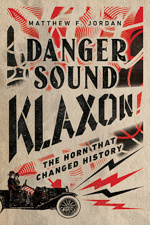Today, we are happy to bring you our conversation with Matthew F. Jordan, author of DANGER SOUND KLAXON! The Horn That Changed History.
What inspired you to write this book?
This book started as another project on how people and cultures have increasingly managed their sound environment by developing “commodity quietness” technology in response to the question of noise. While at the Bibliothèque nationale de France doing archival work, I kept coming across this verb “klaxoner,” that had been integrated into everyday discourse. The emergence of that word, and of the corresponding assimilation of klaxon technology into cultures all over the world, turned out to be a really interesting story. I realized this narrative allowed me to discuss concepts that intrigued me, like how peoples’ interpretation of sounds changes in relation to contingent forces at work in culture and how we increasingly rely on engineers and technology to solve the problems caused by engineers and technology. The rest, as they say, is history.
What did you learn and what are you hoping readers will learn from your book?
I learned that modern technologies of persuasion like multimedia advertising and public relations messaging, applied over time, can be used to sell the public even the noisiest and most unwanted sounds imaginable. That with enough creative and repeated application of these powerful forces, the public can be conditioned to desire almost anything. Yet at the same time, those who sell consumer technology using these modern forms of communication cannot control how the technology is used once it is out in the world. Whether it’s the automobile or the klaxon or social media today, once unleashed these forces find their own way.
What surprised you the most in the process of writing your book?
I was surprised at the global scale of the story. Despite the many efforts by different towns, cities, and countries to regulate their soundscape and work through the implications of the noisy technology being used to communicate, in just a hand full of years the klaxon managed to spread out to wherever automobiles were being used. It surprised me how similar the debates were in different locales. One of the wonderful things about digital archives today is that it’s possible now to chase down leads at the speed of the electrical signal and make sense of the international spread of technology without having to travel to different national archives to read microfilm & page through old tomes.
What’s your favorite anecdote from your book?
There are so many great anecdotes that it’s hard to narrow it down to one, but several drawn from the experiences of soldiers in the trenches that echo one another help give a sense of how the association of the klaxon sound with war trauma quickly changed how people heard it. Tales of the dank dark nights spent with trained ears listening for the tell-tale sounds of gas attack and the descriptions of successive waves of hand cranked klaxons cascading hundreds of miles from trench to trench to warn of the approach of killer clouds of gas really help to activate a reader’s historical imagination.
What’s next?
I hope to get back to finishing the book on quietness technology that Danger Sound Klaxon emerged from but am currently directing Penn State’s News Literacy Initiative, a multiprong initiative with a mission to educate the public about the misinformation and disinformation posing as news imperiling our democracy. Forty percent of Americans avoid the news, often for good reason, and we’re hoping to train them to listen for the news often drowned out by the noise. As part of his, I am hosting a podcast called “News Over Noise” that will be available wherever people get their podcasts and will be broadcast as a ½ hour show on public radio stations across the Commonwealth.




